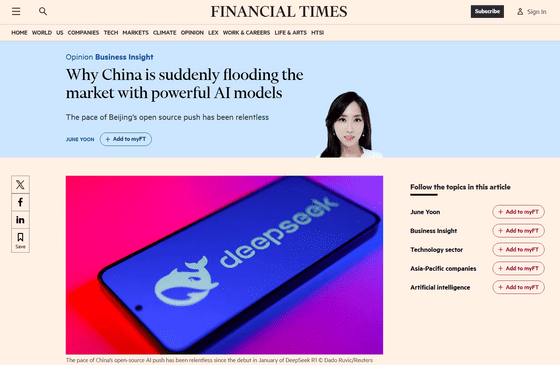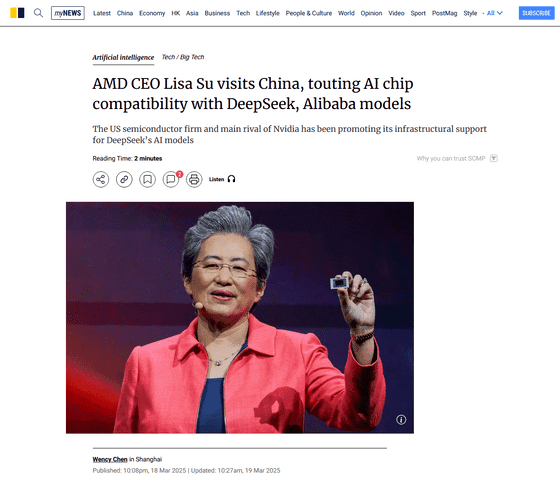Chinese companies such as DeepSeek, Baidu, and Alibaba are open-sourcing their AI models to circumvent U.S. regulations

In January 2025, Chinese AI company DeepSeek surprised Western AI researchers by releasing an inference model comparable to OpenAI's model, '
Why China is suddenly flooding the market with powerful AI models
https://www.ft.com/content/13df6250-dffb-40fc-bb79-309764fa3905

So far, most American AI companies, including OpenAI, Google DeepMind, and Anthropic, have treated AI as a proprietary resource, restricting full access to their most advanced models and making them available only through paid subscriptions or enterprise plans.
The US government also sees open-source AI as a security risk, fearing that unregulated models could be used for cyber attacks, and Congress has already proposed banning DeepSeek's AI from being deployed on government devices, citing national security concerns.

In contrast to this American stance, Chinese AI companies are rapidly releasing open AI. The Financial Times pointed out that 'Open sourcing AI not only allows China to circumvent American sanctions, but also decentralizes development and allows it to improve its models by leveraging talent from around the world. Even restrictions on NVIDIA's high-performance chips will be less of an obstacle if other countries train and improve Chinese models on alternative hardware.'
AI requires continuous improvement for progress, but companies developing closed-model AI must conduct research on improvements and optimization on their own. In contrast, open-model AI is researched by developers all over the world, so Chinese AI companies make their models available for anyone to download and use for free.
This strategy also aims to fundamentally shake up the AI ecosystem the US is building: if free AI becomes as powerful as proprietary models, no one will pay high fees for proprietary models from US AI companies.
Perhaps sensing these trends, Lisa Su, CEO of AMD, NVIDIA's main competitor, visited China on March 18, 2025 to highlight the compatibility of AMD's chips with DeepSeek's AI models and Alibaba's Qwen series.
AMD CEO Lisa Su visits China, touting AI chip compatibility with DeepSeek, Alibaba models | South China Morning Post
https://www.scmp.com/tech/big-tech/article/3302895/amd-ceo-lisa-su-visits-china-touting-ai-chip-compatibility-deepseek-alibaba-models

However, this approach is risky and desperate, since the spread of free and high-quality AI puts Chinese companies at risk of losing their profits. In addition, there is a possibility that the Chinese government will begin to strictly regulate AI under the pretext of suppressing misinformation or complying with national policies, so it is unclear how long this approach of keeping AI open can be sustained.
The Financial Times concluded, 'The flooding of the market with open source AI at this time is no coincidence, but a response to a closing opportunity. With export controls on US chips and AI technology tightening under President Trump and China's own model taking hold, the best thing China can do is not to fight head-on, but to flood the AI market with free AI, making the US victory meaningless.'
Related Posts:
in Software, Posted by log1l_ks







